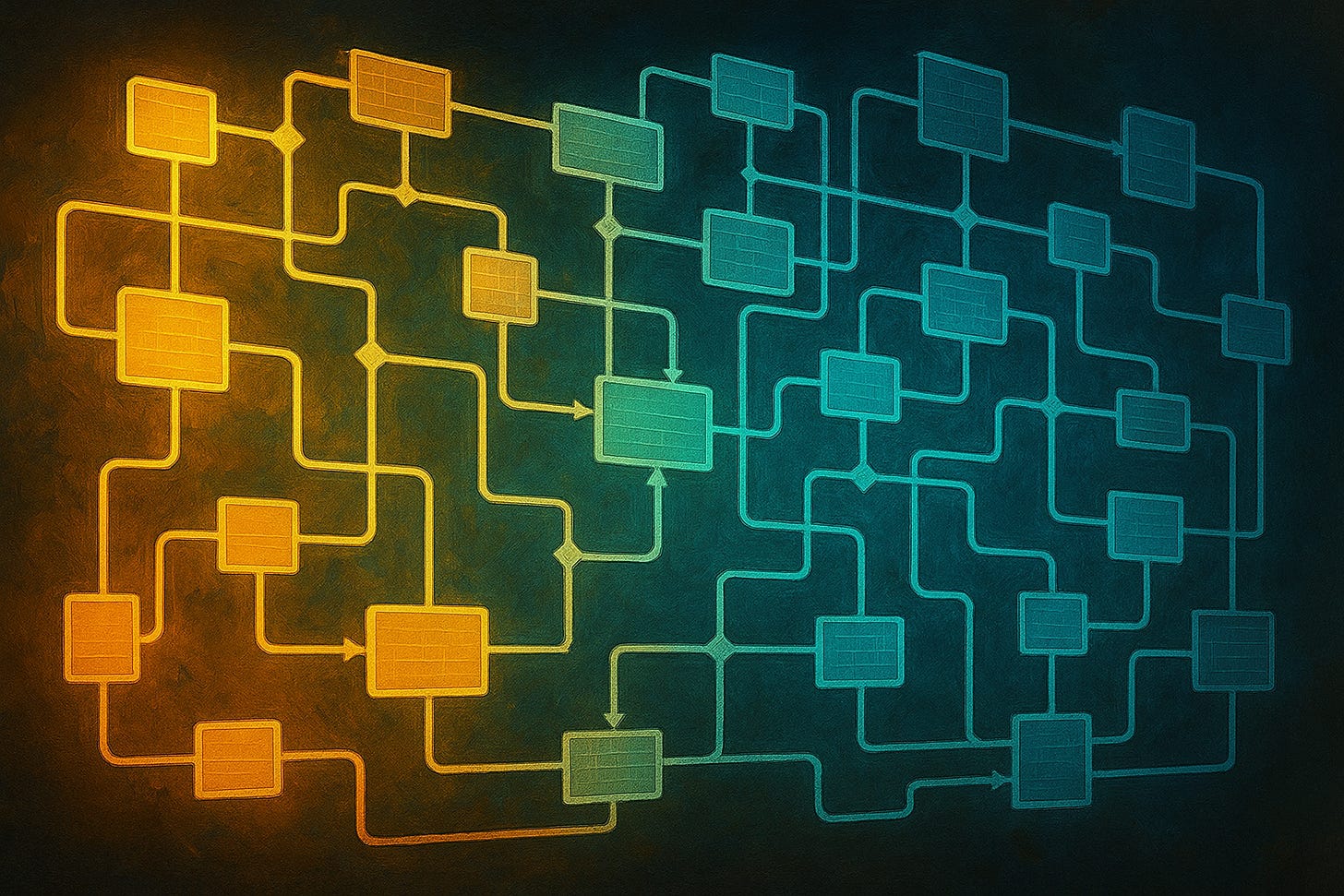I’ve been researching this topic for months, and I want to share with you what I found useful. Maybe my perspective as an IT professional brings some value.
A kind reminder before we dive deeper:
When we are scared, it becomes easy to escape, hide, or ignore what seems unavoidable.
I believe it’s true that AI presents multiple threats to what we are used to. The alert we feel, the warning, is real.
What matters now is how we respond. Each one of us needs to draft a strategy.
To do that, it’s helpful to understand how technology has reshaped skills in the past — and what patterns might repeat.
What Changes — and What Stays
In the past, it was about building a website for your business, learning productivity tools like Excel or PowerPoint, or creative ones like Photoshop and Illustrator.
The majority chose to learn the basics; a few went deep and became experts.
Some got jobs or gigs because of their software expertise, others because of their non-IT skills.
Now, the questions are different:
Which jobs are going to be available after the widespread use of AI?
Which non-IT skills will be needed when AI becomes standard?
The Main Mistake We Make About AI
We assume that a thinking machine can become conscious because we believe we are thinking beings. But we are much more than that.
We fear AI becoming conscious because then it could think and decide against us. Like we do.
But thinking alone has never been the full definition of being human.
Aren’t we ignoring a big part of what makes us who we are?
Our emotions, our biology, our unique individuality, our collective achievements?
At this moment, AI only improves on a narrow slice of what we do: It processes information, reasons, and manipulates knowledge — often faster and more accurately than we can.
But knowledge and reason are also the source of many human mistakes, aren’t they?
Thinking that we know often hides how much we don't.
AI may surpass us in thinking tasks, but life is not just thinking.
Life is feeling, experiencing, connecting, and creating meaning — things that no machine can authentically experience.
The Real Problem with New Technologies
Since the beginning of civilization, every time we develop a new technology, we use it to compete with others.
We weaponize it to gain an advantage.
After a while, everyone else does the same. Weapons become part of a deterrent strategy, and fear feeds itself.
Instead of resolving the causes of fear, we keep developing more technologies to stay ahead.
A short-circuit of fear, endless, and self-reinforcing.
The real problem isn’t the technology itself. It’s how humans choose to use it against each other.
If that's the case, why don't we focus more on solving what makes us so afraid of one another?
Is this the opportunity for our nations to jump out of the hamster wheel?
What AI Will Bring (Sooner Than We Think)
AI will bring more productivity, new technologies, and new perspectives — at a speed we haven’t experienced before.
It will force our civilization to adapt, to ask new, uncomfortable questions.
AI will help detect corruption and crime. But those who benefit from illicit systems will resist change fiercely.
Many industries will have to reinvent themselves to stay relevant. The ones that resist will likely suffer the most.
The powerful will use AI to profit and reinforce their influence, they are already trying to mold the technology to serve their interests. (See the example of the infamous Tech Bros.)
And those among us who live with chronic hate?
They could cause enormous pain to the rest.
All of this is a globally seismic force.
What AI Will Become
AI will become standard.
But the power of this technology is far bigger than the Internet, global supply chains, or communication networks.
I would compare it to atomic theory — a civilization-changing discovery.
AI isn’t a tech problem.
It’s a global, human, political, and moral problem.
A technology that promises so many positive outcomes will also force our civilization to transform, if we want to avoid using it to destroy ourselves.
Isn’t it amazing?
Let’s Get Real: What AI Can Offer You
Now that you’ve read the full context, I’m sure you’re someone willing to listen to your fears — and take action anyway.
You’re probably asking yourself:
How can AI help me develop my skills and profession?
How can it improve my quality of life?
I’m with you there.
While we still have time, I believe there are a few important fields of action:
Professionally
Just like Excel and Photoshop became requirements for certain jobs, process automation and workflow automation will be key skills for businesses in their digital transformation.
Learning how to understand, design, and automate processes will be essential.
In Terms of Creativity
Our human traits — the unique prism through which each one of us expresses — are things that AI can imitate but never truly compete with.
AI tools can enrich your creative process:
They can help with ideation, research, and even learning new techniques.
Almost all creative software today integrates AI.
Just start — your originality is still irreplaceable.
Personally and Socially
AI can support community building, connection, and synergy.
Platforms like Substack use technology to help people discover each other, find common ground, and support one another.
Choose platforms built on principles that unite, not divide.
Stay aware of developments related to human rights, privacy, and freedom.
Find tools that are designed to protect your interests, not just extract your data.
Keep an eye on AI tools connected to your areas of expertise. Try them. Test them.
Get your conclusions and your use cases.
And remember:
Many people are trying to monetize their AI knowledge right now.
Some offer value. Others just chase trends.
Keep a healthy skepticism, because no one knows exactly where the AI trend is going yet.
A Special Warning
At first, any tool gives a competitive advantage. But soon, everybody uses it, and it becomes standard.
When everyone uses technology the same way, it can become an obstacle to real innovation.
Technology can make things faster, but faster doesn’t always mean better.
Especially when the human factor is ignored.
Efficiency doesn’t automatically bring more free time or a better quality of life.
Often, it just raises the bar higher for everyone.
We must be aware:
AI should not enslave us to new productivity expectations.
It should empower us to live better and more harmoniously.
Closing Reflection
Ultimately, the real success story with AI won't be about faster profits or bigger empires.
It will be about reclaiming our time, deepening our human connections,
and creating a future where technology serves life, not the other way around.
Each of us has the chance to build something beautiful, strong, and meaningful.
It starts with the choices we make today.
With love,
Jose.
👉🏼 Fear is Not Your Enemy—But It’s Not Always Your Friend
You might feel you already know what fear is. And maybe you even think the definition doesn’t really matter.














What a superb take. This article really nails the subject.
AI = tool and therefore a brief advantage for early adopters. Then it’s mainstream and is just faster. This concept is critical to understand. That also means the late or non-adopters can be left behind. And, in a world already divided, this could be a problem.
I was thinking about this the other day. How do I describe the benefits of AI to me? It makes things faster, but it’s still me. That was as close as I could get. Im still thinking on the subject and delving into AI from different angles.
Thank you for sharing this 🙏
What a great piece.
I’ve been writing or incorporating my ai us with my writings lately.
A big thing for me was its ability to help map out my neurodivergence and well make my life easier as I began to understand myself deeper.
It’s also been a great tool in helping improve my writing flow. Something I struggled with for years. Instead of having it write content. I’ve been using it as an editor which has taught me to format and create better writing. A great tool for a neurodivergent person who’s struggled to get the way I think or speak written.